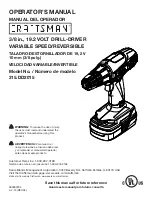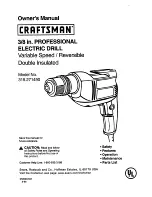
2
1
6
11
10
5
4
8
7
3
8. Adjustment
1. Motor
7. Red
2. Zero voltage switch
8. Brown
3. Secondary winding
9. Yellow green
4. Blue
10. Body
5. White
11. Motor housing
6. Main winding
Quill Speed Change (Fig. 16)
1. Disconnect the drill column from the voltage source.
2. Open the pulley housing
3. Release the slide rails knob (1).
4. Tilt the motor forward to release tension on both the belts.
5. Re-set the belts in the pulleys corresponding to the required quill speed (2).
6. Stretch the belts and tilt the motor to the machine rear side.
7. Tighten the slide rails knob (1).
8. Close the pulley housing.
9. Turn the machine on to check if the belts tension is correct.
Bench Adjustment (Fig.17)
1. The bench may be lifted or lowered to a required position by releasing the column lock (1) and turning
the crank (2). Before drilling is started. the column lock has to be re-tightened.
2. If you want to turn the bench around the column. release the column lock (1) and then re-tighten it
again.
3. If you want to turn the bench only. release the bench lock (3) and turn the bench to the required
position. Re-tighten the lock again.
4. If you want to se the bench at an angle of 0
0
- 45
0
(to the right/to the left). remove the pin (4) and the
nut (5). If the pin is stuck. turn the nut (5) clockwise until the pin slips out. Release the bench lock
screw (6). incline the table at the required angle and tighten the screw (6). If you want the bench put
back in the position of 0°. insert the pin again (4) and tighten the screw (6). Transversal setting scale
spacing is on the bench attachment device (7).
26



































